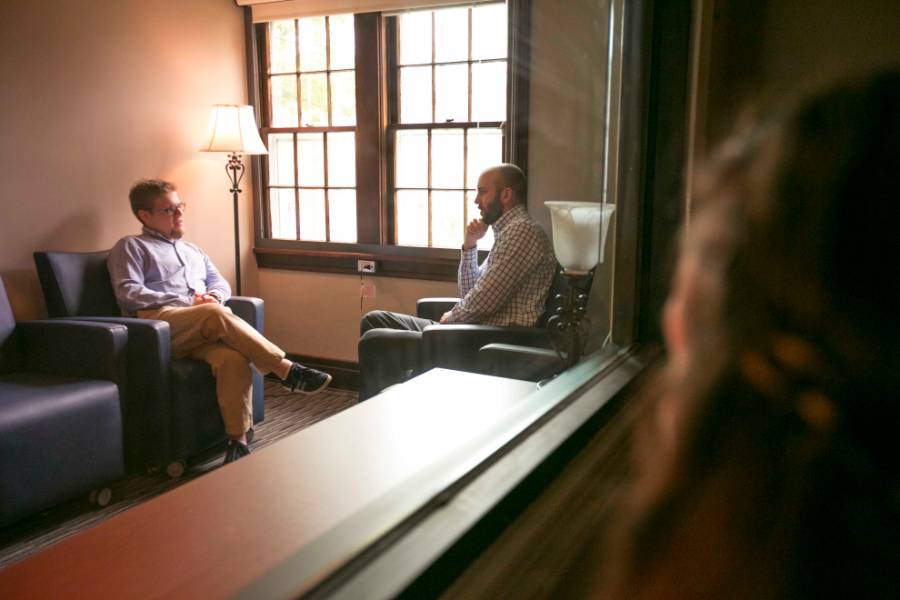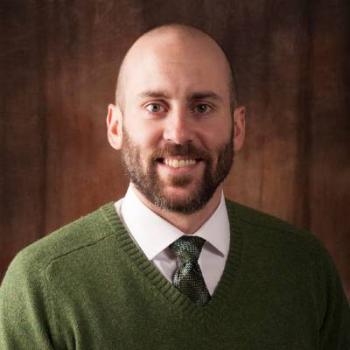Tips for managing new reality of isolation at home
As families around the world continue to be at home to help combat the spread of the COVID-19 virus Lipscomb's Justin Briggs shares tips for navigating this unusual time.
Kim Chaudoin |

As the nation adjusts to working remotely and schools moving online, feelings of fear, anxiety and hopelessness are becoming prevalent among individuals and families who are trying to adapt to their new reality.
Justin Briggs, assistant professor and clinical director of the Lipscomb Family Therapy Center, says dealing with this uncertainty can be overwhelming. But, he also says there are actions people can take to help navigate these uncharted waters to help stay mentally and emotionally healthy.
Following are several suggestions Briggs has for individuals and families to put into practice at home. For more ideas check out his blog at https://www.jgregorybriggs.com/blog-archive.
- Set boundaries on the intake of COVID-19 information. New stories and information about COVID-19 seems to be released by the minute which can become overwhelming. Briggs suggests setting a limit on the amount of time spent watching and reading information about the virus. For example, limiting reading on the virus to five minutes at a time no more than a few times each day (i.e., 15 minutes total) will keep you informed and will be less likely to leave you feeling overcome.
- Be creative. As Briggs says, we can “wait patiently or impatiently” during this time. Both are difficult but it is easier to practice patience. Patience requires us to think and do things that distract us from the thing we are waiting for. While practicing social distancing, find creative ways to pass the time: play games, read a book, talk with friends and family (using electronic means), exercise, cook meals from scratch, etc.

Justin Briggs
- Plan independent time. During this time it is important for parents and families to spend time together but it is also important for adults and children to have time apart as well. Set aside time for reading or working on a hobby. Scheduling alone time can be a way of reenergizing yourself during a time when it is easy to feel like we can’t get away from the other people in our house.
- Avoid too much or too little of anything. Technology can be a blessing or a curse! While technology helps education continue online and keeps people connected, too much of it (e.g., binge watching TV) is not necessarily a good thing. Likewise, too little independent time or rest is not healthy either. All or nothing thinking usually isn’t ideal. Moderation is key.
- Set realistic goals. Setting goals is important in life and can be particularly helpful during unsettling times. When setting goals make sure they are achievable. If you’ve been feeling anxious about the virus and can’t seem to stop thinking about it, challenging yourself to think and behave in a healthier way for seconds at a time is often doable. Try to focus on reading a single sentence or paragraph rather than attempting to finish an entire book by the end of the week. What many people find is that they often are able to meet several “micro-goals” in a row, allowing them to accomplish larger tasks through a series of small victories.
- Be kind. Practicing kindness is always a good thing, but may feel even more important at a time when many are anxious and feeling isolated. Spend time thanking God and others for the things you are grateful for. Call someone you haven’t talked to in a while. Go to the grocery store for an older neighbor. Send someone a hand-written note to let them know you are thinking about them.
- Monitor sleep, diet, and exercise. If our body isn’t functioning well, our mind, emotions, and relationships usually aren’t either. It is critical to make sure you are taking care of yourself by getting the proper amount of sleep and eating healthy. For most adults, 7-8 restful hours should be enough. Practicing good “sleep hygiene” by going to bed and waking up at the same time each day is often helpful when trying to improve your sleep. Diet and exercise are also critical. Eating healthy food in healthy portions and being physically active helps us to be our best mentally and emotionally. Many of us have more time to cook healthy meals and get outdoors and enjoy nature--we would be wise to take advantage of this opportunity.
- Remember what experts are saying. Unless you’re on the front lines treating or studying COVID-19, you’re going to be learning about the virus on someone else’s authority. Although everyone is entitled to his or her opinion, we would be wise to remember that not all opinions weigh the same. An epidemiologist likely knows more about COVID-19 than a blogger, journalist, or 24-hour news broadcaster. Think critically about the information you take in and remember that people who have dedicated their lives to studying illness probably have more accurate information about COVID-19 than those who don’t. The scientific community and organizations such as the Centers for Disease Control and World Health Organization certainly aren’t perfect, but they have a strong record of providing useful information and advice on wellness. Simply put, the opinions of scientists and those in healthcare on COVID-19 need to carry more weight than those of bloggers, journalists, and many of the voices on social media.
Briggs joined the faculty at Lipscomb University in 2014. He is the founder of The Briggs Institute Inc., an individual, couple, and family therapy private practice in Nashville. He completed his Ph.D. in human development and family studies at Purdue University and earned his M.S. in marital and family therapy at the Family Institute at Northwestern University. He is a licensed marriage and family therapist, American Association for Marriage and Family Therapy (AAMFT) Clinical Fellow, assistant professor, and director of the Lipscomb Family Therapy Center. In addition to his clinical work and research, Briggs is an AAMFT Approved Supervisor. This designation signifies that he has attained the educational, experiential and supervisory training required for the competent supervision of marriage and family therapists and trainees.
The mission of the Lipscomb Family Therapy Center (LFTC) is to serve the mental health and relationship care needs of individuals, couples and families in the Nashville community. LFTC provides a comfortable and confidential therapy setting to discuss issues you may be struggling with. For more information or to schedule an appointment, call 615.966.5300 or visit www.lipscomb.edu/about/offices-and-services/lipscomb-family-therapy-center.